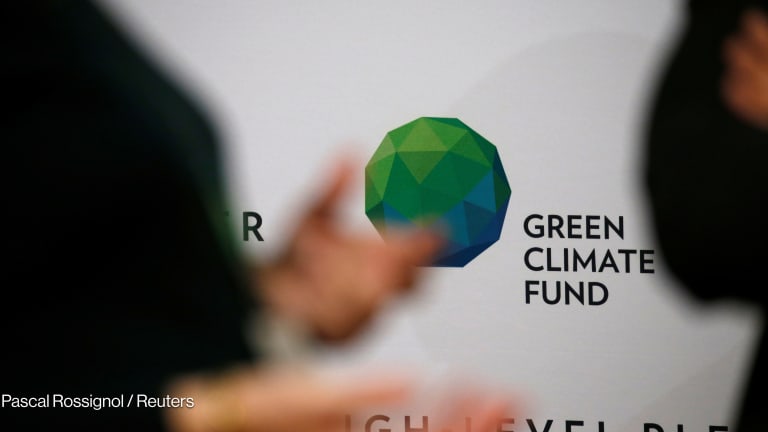GCF board approves record $1.2B in funding and accreditation overhaul
By Ayenat Mersie // 07 July 2025
The Green Climate Fund board has approved its largest single round of climate finance — $1.225 billion for 17 projects — and has adopted sweeping reforms to overhaul its often-criticized accreditation system to make it easier for organizations to access the funds. The decisions, made at the fund’s latest board meeting which concluded on Thursday, come as global development finance faces mounting constraints, with GCF leadership underscoring the need to keep ambition high. “We felt that 2025, given the context, we as the largest climate fund needed to keep our ambition high. We needed to make sure that we were leading that coalition of the ambitious,” Henry Gonzalez, GCF’s chief investment officer, told Devex. Headquartered in South Korea and funded by sovereign donors, GCF since its founding in 2010 has received pledges totaling $29.9 billion, with $21 billion paid in so far. The United Kingdom, Germany, and France are its top three contributors. The United States is notably absent from that list: Soon after returning to office in January, President Donald Trump — who had attacked GCF during his first term — rescinded $4 billion in pledges. But according to Gonzalez, the fund remains on solid footing. He explained that during the 2022 replenishment conference — part of its regular four-year funding cycle — GCF had planned around a conservative base-case scenario of about $10 billion, with a higher, more ambitious target in mind. The loss of the U.S. pledge ultimately brought the total back to that level. Gonzalez said the fund ended up with $10.6 billion in commitments, 92% of which has already been signed and mostly paid. GCF is aiming to approve at least $3 billion in funding to organizations this year, with Gonzalez describing the pipeline for the next quarterly cycle as capable of exceeding $1 billion. “I think there was a record in the number of projects. This year, we would like to have a record in the quantum,” he added. Among the newly approved projects are the Dairy Interventions for Mitigation and Adaptation, or DaIMA initiative — GCF’s first dedicated livestock investment, which entails $150 million to strengthen climate resilience in East Africa’s dairy sector to improve livelihoods for nearly 18 million people and mitigate up to 2.2 million tons of carbon dioxide equivalent, or CO₂e. GCF has faced criticism that its funding can be slow to reach smallholder farmers and other climate-vulnerable groups. Gonzalez said the fund is working to address this through targeted programming and partnerships, such as the €200 million Kuali Fund in Latin America developed with COFIDES, a Spanish development finance institution, and GAWA, an impact investment firm. It helps microfinance institutions offer loans to farmers adopting sustainable, climate-friendly practices. He also pointed to efforts to expand access for often marginalized groups through work with Indigenous communities. “In this board meeting, we also accredited an entity that deals with Indigenous people and land tenure and land rights to allow some of that. We're going to be co-hosting with the government of Malaysia an indigenous people conference,” Gonzalez said. Other major investments include the $227 million Global Green Bond Initiative with the European Investment Bank, which aims to expand green bond markets in 10 countries while reducing 2.3 million tons of CO₂e; and the $200 million India Green Finance Facility with the Asian Development Bank to scale renewables and energy efficiency, targeting 50 million tons of avoided emissions. GCF’s board also approved an overhauled accreditation system intended to address criticisms of the process being too slow and complex with backlogs of applicants and barriers for many to access funds. Accreditation is the process through which organizations become eligible to partner with GCF and get funding to implement climate projects. Accredited entities range from development banks such as the African Development Bank, NGOs such as ACTED, and regular banks such as KCB Kenya. While accreditation does not guarantee funding, it is essential for accessing GCF resources. “The current accreditation had several barriers to entry that made it very difficult for entities to be accredited quickly … depending on the entity it could be up to three years sometimes in the process. And we even have a backlog of a lot of entities that want to access us,” Gonzalez said. “The accreditation panel's review process will now be done within nine months,” he added. Achala Abeysinghe, GCF’s director of investment services, highlighted gaps in equitable access: “Right now, we have more than 150 partners, but we also have more than 105 countries without a single national entity accredited. So we are trying to help countries have a faster process for entry so that the countries get more partners to program with GCF.” The reform splits accreditation into two stages: an initial “accreditation” or “partnership” phase and a second “programming” phase. The first stage will have a maximum review time of nine months and focuses on meeting GCF’s core requirements in a more tailored, fit-for-purpose way. Once accredited as partners, organizations can then access capacity-building support and technical assistance to help them develop strong funding proposals during the programming phase. The reforms also expand GCF’s “fast-track” accreditation program to avoid duplicating assessments already done by other major climate and development funds. “We can also check, assess the requirements that have already been assessed by other comparative organizations so that we don’t have to do all the assessments from A to Z because other comparative organizations have already done it. So it’s called a fast-track program,” Abeysinghe said. She noted that while GCF already accepted fiduciary standards vetted by organizations such as the Adaptation Fund and Global Environment Facility, it will now extend this to include the World Bank and African Development Bank. Environmental and social safeguards will still undergo full GCF review, given the fund’s higher standards in these areas. The new system will take effect after the next board meeting later this year, with a one-year transition period for applicants already in progress.
The Green Climate Fund board has approved its largest single round of climate finance — $1.225 billion for 17 projects — and has adopted sweeping reforms to overhaul its often-criticized accreditation system to make it easier for organizations to access the funds.
The decisions, made at the fund’s latest board meeting which concluded on Thursday, come as global development finance faces mounting constraints, with GCF leadership underscoring the need to keep ambition high.
“We felt that 2025, given the context, we as the largest climate fund needed to keep our ambition high. We needed to make sure that we were leading that coalition of the ambitious,” Henry Gonzalez, GCF’s chief investment officer, told Devex.
Printing articles to share with others is a breach of our terms and conditions and copyright policy. Please use the sharing options on the left side of the article. Devex Pro members may share up to 10 articles per month using the Pro share tool ( ).
Search for articles
Most Read
- 1
- 2
- 3
- 4
- 5








